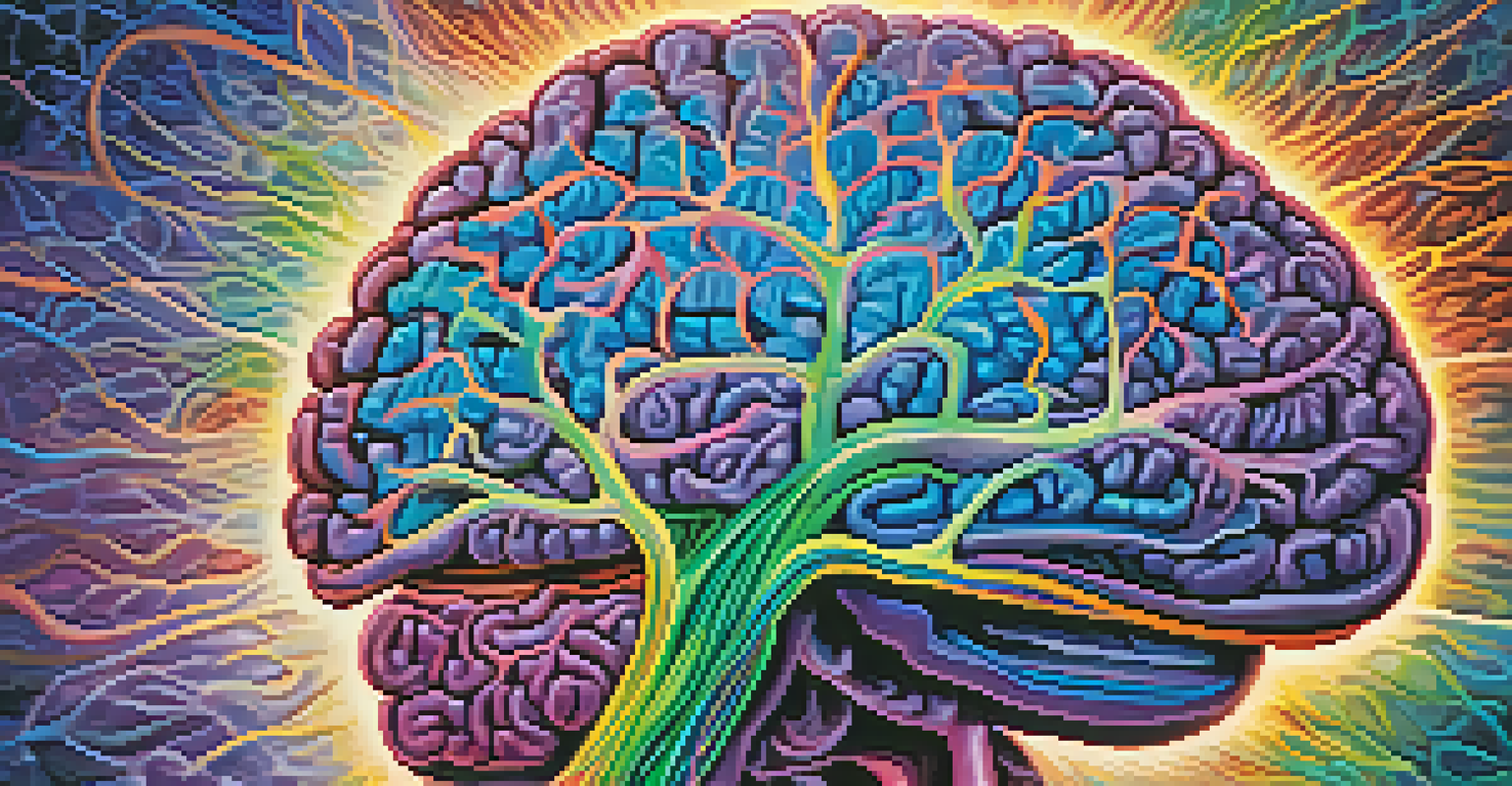The Brain’s Response to Peyote: Insights from Studies

What is Peyote and Its Historical Context?
Peyote is a small cactus known for its psychoactive properties, primarily due to the compound mescaline. Traditionally, it has been used by Indigenous peoples in North America for spiritual and medicinal purposes. This rich history adds a layer of cultural significance to its study, making it not just a subject of scientific inquiry but also a focal point for understanding human consciousness.
Psychedelics can help us confront our fears and trauma, allowing us to process and integrate experiences in a way that traditional therapies often don't.
In modern times, peyote has drawn attention from researchers interested in its effects on the brain and mind. As society becomes more open to exploring altered states of consciousness, the intersection of traditional practices and scientific research becomes increasingly relevant. Understanding peyote's historical context helps frame the ways in which it can impact mental health and spirituality.
Through ancient rituals and modern studies, peyote serves as a bridge between cultures and knowledge systems. By examining both its past and present, we can gain insights into how this cactus influences not only individual users but also broader societal beliefs about consciousness.
Psychoactive Components: How Mescaline Affects the Brain
The primary psychoactive component of peyote is mescaline, a substance that alters perception, mood, and consciousness. When ingested, mescaline interacts with serotonin receptors in the brain, particularly the 5-HT2A receptor, which plays a crucial role in regulating mood and sensory perception. This interaction can lead to vivid hallucinations and altered states of awareness, making it a fascinating subject for neuroscience.

Studies have shown that mescaline can enhance emotional processing and creativity, leading to profound personal insights. This effect has intrigued researchers, especially in the context of therapy, where altered states can facilitate new perspectives on mental health issues. By understanding these mechanisms, we may find new ways to approach psychological treatment.
Peyote's Cultural and Spiritual Roots
Peyote has been used by Indigenous peoples for spiritual and medicinal purposes, intertwining cultural significance with its psychoactive properties.
Moreover, the effects of mescaline on the brain can vary depending on dosage and individual differences. This variability highlights the complexity of psychoactive substances and underscores the importance of tailored approaches in both research and therapeutic settings.
Neuroscientific Studies: What the Research Reveals
Recent neuroscientific studies using brain imaging techniques have provided valuable insights into how peyote impacts brain function. Research indicates that mescaline can lead to increased connectivity between different regions of the brain, suggesting a temporary reorganization of neural pathways. This phenomenon may explain the heightened sense of awareness and interconnectedness reported by users.
The mind is like a parachute. It doesn’t work if it is not open.
For instance, one study found that individuals under the influence of mescaline exhibited more synchronized brain activity, particularly in areas associated with emotion and sensory perception. This synchronization could be a key factor in the profound experiences often described during peyote sessions, such as feelings of unity and transcendence.
These findings not only contribute to our understanding of peyote but also open doors for further research into other psychedelics and their potential therapeutic applications. The insights gained can inform how we approach mental health and spirituality in a modern context.
The Role of Set and Setting in Peyote Experiences
One of the critical factors influencing the effects of peyote is the concept of 'set and setting.' 'Set' refers to the individual's mindset, while 'setting' pertains to the physical and social environment in which the peyote is consumed. Both elements significantly shape the nature of the psychedelic experience, impacting emotional outcomes and insights gained.
Research suggests that a positive mindset and a supportive environment can enhance the beneficial effects of peyote, while a negative setting may lead to adverse reactions. This understanding underscores the importance of preparation and intention in psychedelic experiences, making it essential for users to create a conducive atmosphere for their journey.
Mescaline's Impact on the Brain
Mescaline, the psychoactive compound in peyote, alters perception and mood by interacting with serotonin receptors, leading to profound insights and emotional processing.
By emphasizing the significance of set and setting, we can better appreciate the holistic nature of peyote experiences. This approach not only applies to peyote but also to other psychedelics, providing valuable lessons for those exploring altered states of consciousness.
Therapeutic Potential: Peyote and Mental Health Treatment
As interest in psychedelics for mental health treatment grows, peyote's potential therapeutic applications are being explored. Some studies suggest that mescaline could be beneficial in treating conditions such as depression, anxiety, and PTSD. The ability of peyote to facilitate emotional breakthroughs may provide new avenues for individuals seeking relief from mental health challenges.
Therapists and researchers are now looking into how controlled peyote experiences can be integrated into therapeutic settings. By guiding individuals through their experiences, therapists can help them process emotions and gain insights that may not be accessible in conventional therapy. This innovative approach could revolutionize mental health treatment.
However, further research is needed to establish the safety and efficacy of peyote as a therapeutic tool. As we continue to investigate its potential, it’s crucial to approach this work with respect for Indigenous practices and the cultural significance of peyote.
Challenges and Considerations in Peyote Research
While research into peyote offers exciting possibilities, it also comes with challenges. Legal restrictions surrounding the use of peyote can hinder scientific studies, making it difficult to conduct comprehensive research. Navigating these regulations is essential for researchers aiming to explore the full range of peyote's effects on the brain.
Additionally, ethical considerations must be taken into account, particularly regarding the cultural context of peyote use. Researchers must engage with Indigenous communities to ensure that studies are respectful and beneficial to these groups. This collaboration can help bridge the gap between scientific inquiry and traditional knowledge.
Therapeutic Potential of Peyote
Research indicates that peyote may offer new avenues for treating mental health issues like depression and PTSD through guided psychedelic experiences.
By addressing these challenges head-on, researchers can create a more inclusive and ethical framework for studying peyote, ultimately leading to a deeper understanding of its impact on the brain and mind.
Future Directions: What Lies Ahead for Peyote Research?
Looking ahead, the future of peyote research appears promising, with growing interest from both the scientific community and mental health professionals. As societal views on psychedelics continue to evolve, we may see more funding and support for studies exploring peyote's effects and potential therapeutic applications. This shift could lead to groundbreaking discoveries in the field of psychology and neuroscience.
Moreover, advancements in research methodologies and technology will likely enhance our ability to understand how peyote interacts with the brain. Improved imaging techniques may provide even more detailed insights into the neural mechanisms underlying peyote's effects, paving the way for innovative therapeutic approaches.

Ultimately, the ongoing exploration of peyote offers an opportunity to deepen our understanding of consciousness and the human experience. As we uncover the complexities of this ancient plant, we can learn valuable lessons about mental health, spirituality, and the nature of reality itself.